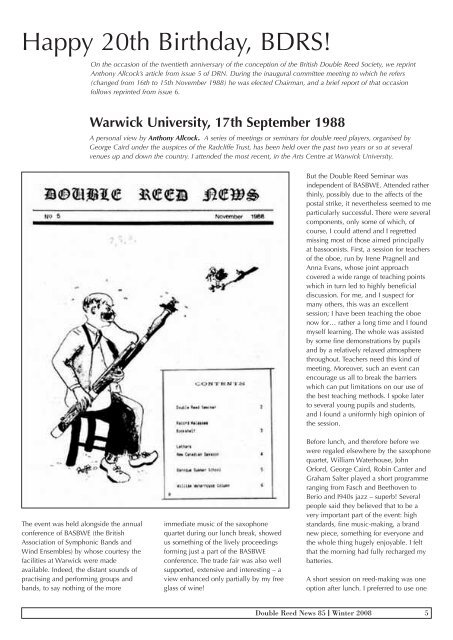Double Reed 70 cover - British Double Reed Society
Double Reed 70 cover - British Double Reed Society
Double Reed 70 cover - British Double Reed Society
Create successful ePaper yourself
Turn your PDF publications into a flip-book with our unique Google optimized e-Paper software.
Happy 20th Birthday, BDRS!<br />
The event was held alongside the annual<br />
conference of BASBWE (the <strong>British</strong><br />
Association of Symphonic Bands and<br />
Wind Ensembles) by whose courtesy the<br />
facilities at Warwick were made<br />
available. Indeed, the distant sounds of<br />
practising and performing groups and<br />
bands, to say nothing of the more<br />
On the occasion of the twentieth anniversary of the conception of the <strong>British</strong> <strong>Double</strong> <strong>Reed</strong> <strong>Society</strong>, we reprint<br />
Anthony Allcock’s article from issue 5 of DRN. During the inaugural committee meeting to which he refers<br />
(changed from 16th to 15th November 1988) he was elected Chairman, and a brief report of that occasion<br />
follows reprinted from issue 6.<br />
Warwick University, 17th September 1988<br />
A personal view by Anthony Allcock.. A series of meetings or seminars for double reed players, organised by<br />
George Caird under the auspices of the Radcliffe Trust, has been held over the past two years or so at several<br />
venues up and down the country. I attended the most recent, in the Arts Centre at Warwick University.<br />
immediate music of the saxophone<br />
quartet during our lunch break, showed<br />
us something of the lively proceedings<br />
forming just a part of the BASBWE<br />
conference. The trade fair was also well<br />
supported, extensive and interesting – a<br />
view enhanced only partially by my free<br />
glass of wine!<br />
But the <strong>Double</strong> <strong>Reed</strong> Seminar was<br />
independent of BASBWE. Attended rather<br />
thinly, possibly due to the affects of the<br />
postal strike, it nevertheless seemed to me<br />
particularly successful. There were several<br />
components, only some of which, of<br />
course, I could attend and I regretted<br />
missing most of those aimed principally<br />
at bassoonists. First, a session for teachers<br />
of the oboe, run by Irene Pragnell and<br />
Anna Evans, whose joint approach<br />
<strong>cover</strong>ed a wide range of teaching points<br />
which in turn led to highly beneficial<br />
discussion. For me, and I suspect for<br />
many others, this was an excellent<br />
session; I have been teaching the oboe<br />
now for… rather a long time and I found<br />
myself learning. The whole was assisted<br />
by some fine demonstrations by pupils<br />
and by a relatively relaxed atmosphere<br />
throughout. Teachers need this kind of<br />
meeting. Moreover, such an event can<br />
encourage us all to break the barriers<br />
which can put limitations on our use of<br />
the best teaching methods. I spoke later<br />
to several young pupils and students,<br />
and I found a uniformly high opinion of<br />
the session.<br />
Before lunch, and therefore before we<br />
were regaled elsewhere by the saxophone<br />
quartet, William Waterhouse, John<br />
Orford, George Caird, Robin Canter and<br />
Graham Salter played a short programme<br />
ranging from Fasch and Beethoven to<br />
Berio and I940s jazz – superb! Several<br />
people said they believed that to be a<br />
very important part of the event: high<br />
standards, fine music-making, a brand<br />
new piece, something for everyone and<br />
the whole thing hugely enjoyable. I felt<br />
that the morning had fully recharged my<br />
batteries.<br />
A short session on reed-making was one<br />
option after lunch. I preferred to use one<br />
<strong>Double</strong> <strong>Reed</strong> News 85 Winter 2008 5


